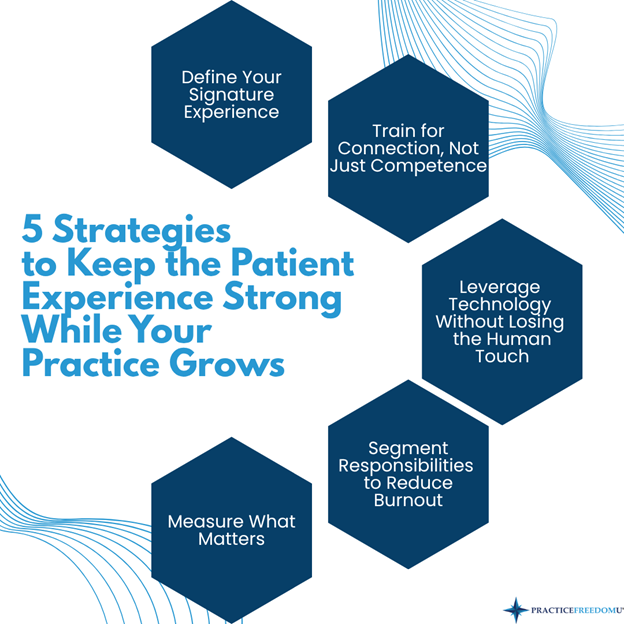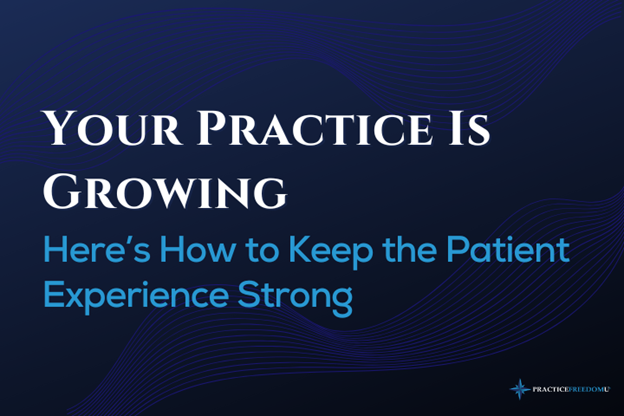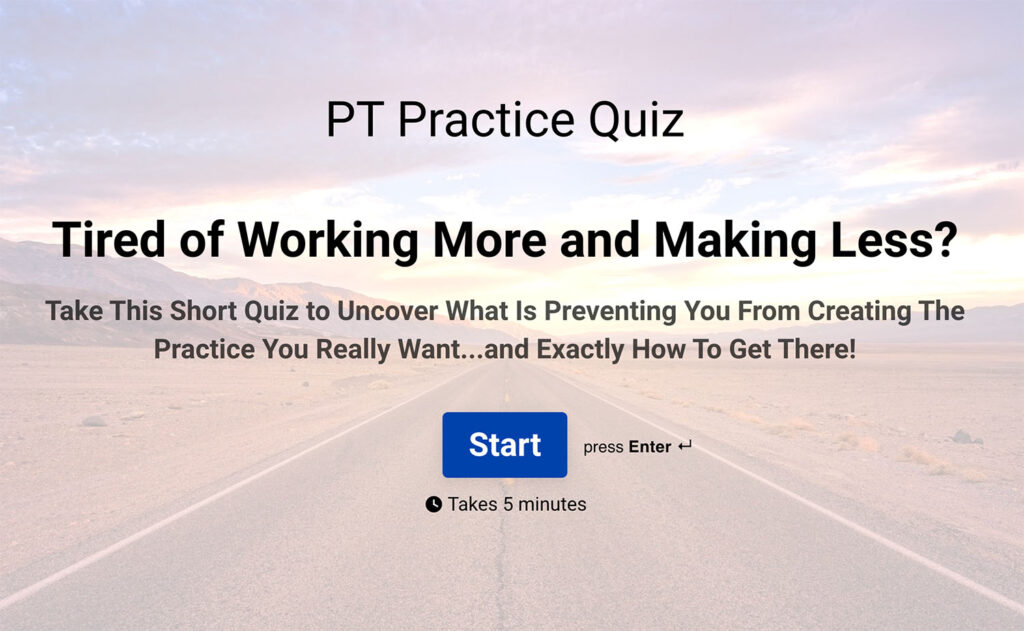One of the most rewarding things about running your own private practice is seeing it grow. More patients, more referrals, more therapists—more impact. But as the numbers rise, so does a quiet threat that can erode everything you’ve built:
The loss of your patient experience.
When your schedule is slammed, your team is stretched, and your systems are playing catch-up, maintaining a high level of personalized care starts to feel like an uphill battle. I’ve seen this happen in practices all over the country, and experienced it myself when my own clinic started to scale.
The truth is, growth is exciting, but it’s also disruptive. And without intentional leadership, it can lead to something I call “experience drift.” That’s when the quality of care subtly starts to decline, not because your team doesn’t care, but because your systems can’t keep up.
If your practice is expanding and you’re feeling that tension between quantity and quality, this article is for you. Let’s explore how to scale patient experience without sacrificing what made your practice special in the first place.
Why Scaling Magnifies Experience Gaps
Here’s what often happens as a private practice grows:
- The owner gets pulled further away from day-to-day patient care.
- The front desk becomes overwhelmed with higher volume and complex scheduling.
- Clinicians are expected to treat more patients in less time.
- Communication starts to break down across departments.
- Patients notice the difference but don’t always say anything.
At first, it seems manageable. A missed phone call here, a rushed appointment there. But over time, those little cracks in the patient experience turn into lost referrals, negative reviews, and lower retention.
And here’s the kicker: when this happens, most owners try to fix it by “doing more.” More training. More meetings. More micromanagement. But the real solution isn’t in doing more. It’s in building a structure that supports high-quality care at scale.
The Myth of “Just Work Harder”
Let’s get one thing straight: your team isn’t the problem. They’re not dropping the ball because they’re lazy or careless. They’re overwhelmed. They’re operating without clear systems, consistent expectations, or enough bandwidth to give each patient the attention they deserve.
And here’s where the myth of “just work harder” shows up. Many owners fall into the trap of thinking that if everyone just hustles a bit more, things will improve. (The Annals of Family Medicine)
But working harder isn’t scalable. Systems are.
The Core Problem: No Defined Patient Experience Framework
Think about it: When was the last time you defined, documented, and trained your team on what the ideal patient experience should look like in your practice?
If your answer is “uh… we haven’t,” you’re not alone. Most private practices operate on tribal knowledge. Everyone has a general idea of what “good service” looks like, but there’s no shared language, no measurable standard, and no process to reinforce consistency.
That’s a problem, because as you grow, the margin for inconsistency grows with you.

5 Strategies to Keep the Patient Experience Strong While Your Practice Grows
Let’s talk about how to change that. These five strategies are designed specifically for mid-sized private practices that are growing fast but want to protect (and even improve) their level of care.
1. Define Your Signature Experience
You can’t scale what you haven’t defined. Start by mapping out the ideal patient journey in your practice—from the first phone call to the final visit. Ask questions like:
- What should every patient feel after their first interaction with us?
- What tone, words, and behaviors reflect our values?
- Where are we currently inconsistent?
Document this in a way your team can understand and act on. Create a patient experience playbook, even if it’s just a simple checklist for now. The clearer your expectations, the easier it is for your team to deliver consistently.
2. Train for Connection, Not Just Competence
Clinical skill is essential but so is emotional intelligence. When you’re growing, don’t just train your team on procedures; train them on presence.
- Role-play how to handle anxious patients.
- Teach front-desk staff how to manage busy days without sounding rushed.
- Reinforce eye contact, body language, and listening skills in team meetings.
Patients remember how they felt in your clinic more than anything else. Prioritize human connection, and you’ll see loyalty skyrocket even when things get busy.
3. Add Technology Without Sacrificing Connection
Automation helps you handle more without doing more, but only if it enhances, not replaces, the personal experience. Use tools like:
- Automated appointment reminders to reduce no-shows
- Intake forms patients can complete online (before they arrive)
- Two-way texting to simplify communication
But beware: don’t let technology create a wall between you and the patient. If every communication feels canned or robotic, you’ll lose the very thing that made people choose your practice in the first place. (Forbes)
Tech should support your systems, not substitute for relationships.
4. Segment Responsibilities to Reduce Burnout
When your team is doing everything, nothing gets done well. As you grow, define roles more clearly and segment responsibilities to prevent burnout.
- Delegate non-clinical tasks away from therapists so they can focus on care.
- Create a designated “patient experience lead” who oversees quality touchpoints.
- Make your front desk a true concierge, not just schedulers, but experience architects.
This structure allows people to do fewer things, but better.
5. Measure What Matters
You can’t improve what you don’t measure. Most practices track revenue and visits, but few track patient experience metrics (AHRQ). Here are a few to consider:
- Net Promoter Score (NPS): How likely are patients to refer you?
- Google and internal review trends: Are patients praising your care or complaining about wait times?
- Drop-off rate: How many patients complete their plan of care?
Review these monthly. Share them with your team. Celebrate wins and identify where adjustments are needed. This keeps your entire practice aligned around what truly matters.
The Owner’s Role: From Doer to Experience Architect
If you’re still trying to manage every piece of the patient experience personally, you’re not leading. You’re bottlenecking.
Your job isn’t to deliver every touchpoint. It’s to design the structure that makes great experiences possible without your constant involvement.
That means:
- Building and documenting processes
- Coaching your leaders
- Reinforcing your values
- Holding your team accountable
This is the shift from being the MVP to being the coach. It’s not easy, but it’s the only way to grow without losing the soul of your practice.
Growth Without Compromise Is Possible
Growing your patient experience along with your practice doesn’t require magic. It requires intention.
Yes, growth brings complexity. Yes, your team will be tested. But with the right systems, leadership, and culture in place, you can grow your practice and deliver an exceptional, personal, unforgettable experience to every patient who walks through your door.
At Practice Freedom U, we specialize in helping private practice owners navigate exactly these kinds of growth challenges. Whether you’re struggling to define your patient experience, overwhelmed by delegation, or unsure how to build systems that grow with you, our coaches are ready to meet you where you are. We work with owners to create customized strategies that protect the quality of care while supporting sustainable growth. You don’t have to figure this out alone. We’ve helped hundreds of practices make this transition, and we can help you too.
Your practice doesn’t have to choose between volume and value. With the right foundation, you can have both.
And when you do? That’s when you go from just being busy… to building something truly remarkable.
————————————————————-
Are you ready for a coach? Join the hundreds of physical therapy owners who are building the practice of their dreams with the support, guidance and direction of a Practice Freedom U Coach. Take the first step towards creating a business that sets you free by scheduling a Discovery Call



